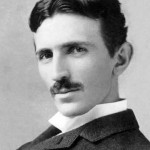“It is quite evident, though, that this squandering cannot go on indefinitely, for geological investigations prove our fuel stores to be limited. So great has been the drain on them of late years that the specter of exhaustion is looming up threateningly in the distance…”
– Nikola Tesla
 Nikola Tesla believed that the thermo-dynamic process, i.e., the burning of fossil fuels, was “wasteful and barbarous.” In particular he singled out coal; at the time in greater use than natural gas and oil, which were slightly less dirty but rapidly extending in use. Despite these warnings from Tesla, we would all grow to become dependent, some would even say addicted, to these fossil fuels as taxpayer subsidies and government investment in national infrastructure would help make them cheap and accessible. Renewables like wind and solar, of course, did not enjoy government subsidies at that time, and were thus severely disadvantaged.
Nikola Tesla believed that the thermo-dynamic process, i.e., the burning of fossil fuels, was “wasteful and barbarous.” In particular he singled out coal; at the time in greater use than natural gas and oil, which were slightly less dirty but rapidly extending in use. Despite these warnings from Tesla, we would all grow to become dependent, some would even say addicted, to these fossil fuels as taxpayer subsidies and government investment in national infrastructure would help make them cheap and accessible. Renewables like wind and solar, of course, did not enjoy government subsidies at that time, and were thus severely disadvantaged.
The mining of coal was especially problematic, Tesla noted, because despite some modern improvement, it still involved significant “dangers to the unfortunates who are condemned to toil deep in the bowels of the earth.” While oil and natural gas were somewhat safer in this regard, (drilling to depth avoided sending people underground), these sources still presented the problem of being finite. Tesla understood that fossil-based resources would eventually run out. And before that would happen, we would reach some level at which the costs of extraction would exceed the revenues that could be earned, making it economically unfeasible.
To this reality we can add the costs that are not accurately captured. Many of these additional costs have been “externalized,” i.e., shifted from the companies that are extracting fossil fuels onto the greater shoulders of society. This includes costs of pollution, particulates and aerosols released to the air, frequent oil spills, catastrophic ecological damage from mountaintop mining, and the rising costs of fossil fuel-related public health and safety concerns. Now that we fully understand the cause of man-made climate change, the trillions of dollars in costs associated with global warming caused by the burning of fossil fuels can be added to the total. Even if we ignore these societal costs, the fossil fuel industry receives tremendous levels of taxpayer subsidy in order to artificially create an “economically feasible” industry. If these externalized costs were factored into an honest free market, the lack of economic viability of the continued use of fossil fuels for energy would become as clear now as it was to Tesla.
Another cost often ignored is national security. The Middle East, Russia, Venezuela, and other hotbeds of discord all represent globally important sources of fossil fuels, especially oil and natural gas. As one Tesla researcher noted in an apt analogy given Tesla’s interest in pigeons, “if you put all the bird food in one place the birds fight each other for it; if you spread it out for all to eat there is no fighting.” The limited and clustered sources of fossil fuel resources certainly suggest a similar result.
While others at the turn of the twentieth century were busy exploiting coal, iron, aluminum, and drilling for oil, Tesla was already recognizing the limits of those endeavors. Rather than consume resources that were both dirty and finite, Tesla believed we needed to think about conservation. “Whatever our resources of primary energy may be in the future,” Tesla wrote, “we must, to be rational, obtain it without consumption of any material.” He believed that natural, renewable, sources of energy could “eliminate the need of coal, oil, gas or any other of the common fuels.”
[The above is adapted from my e-book, Nikola Tesla: Renewable Energy Ahead of Its Time, available for immediate download on Amazon]
David J. Kent is the author of Tesla: The Wizard of Electricity and two e-books: Nikola Tesla: Renewable Energy Ahead of Its Time and Abraham Lincoln and Nikola Tesla: Connected by Fate. He is also the author of Lincoln: The Man Who Saved America and Edison: The Inventor of the Modern World (both Fall River Press).
Check out my Goodreads author page. While you’re at it, “Like” my Facebook author page for more updates!
Follow me by subscribing by email on the home page. Share with your friends using the buttons below.










